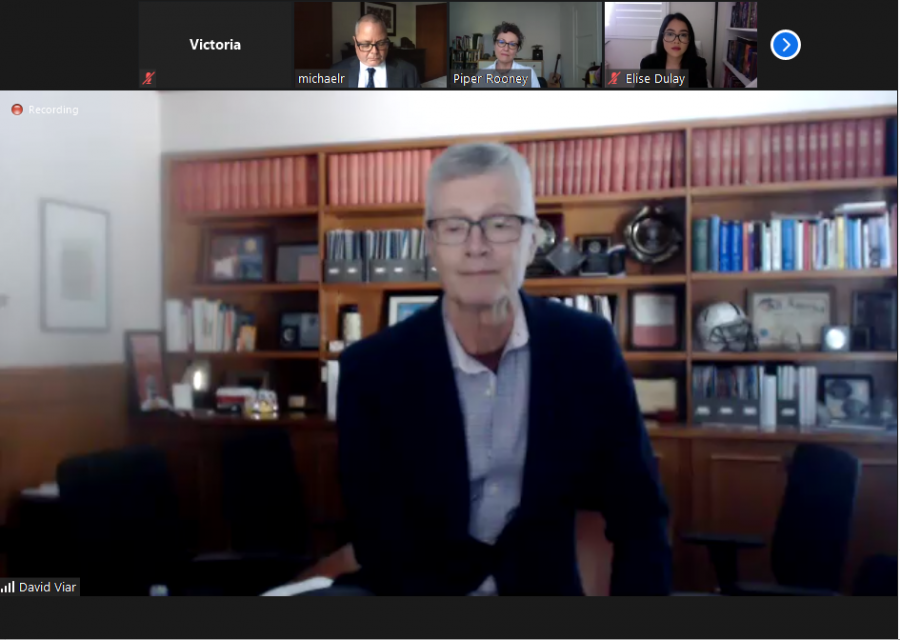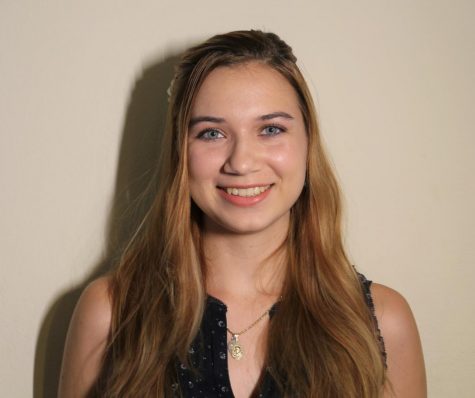GCC Leaders Address College’s Recent Changes in Virtual Town Hall
President Viar and leaders answer questions surrounding student services and federal grants
Dr. David Viar along with other college leaders joined students in a virtual Town Hall on May 15 to provide updates to GCC’s learning structure and answer participant’s questions about the college’s response to the pandemic and the upcoming semesters. The discussion was led by ASGCC members with a total of 115 students attending the conference.
The two-hour live event was hosted by ASGCC’s Senator of Administration Elise Dulay and Peter Braganca. Joining them were key administrative leaders and faculty involved in planning the College’s learning strategies, including Dr. David Viar, Superintendent/President of GCC, Dr. Michael Ritterbrown, Vice President of Instructional Services, Dr. Paul Schlossman, Vice President of Student Services and English instructor Piper Rooney, President of the Academic Senate.
The Zoom conference focused on the college’s progress in expanding most of its now online services and their steps in assisting students in the following weeks. Dr. David Viar began by praising the student workers and commending staff for their quick response and professional development that helped aid the college in its transition to a remote environment.
The college is making consistent efforts to help students adapt to distance learning by setting up various resources like the live Canvas help, which is led by volunteer student workers who assist students Monday through Friday through Zoom, explained Dr. Michael Ritterbrown. The college’s 490 faculty members have also received “40 hours of professional development in the first week of this remote environment to transition students and help them thrive,” said Ritterbrown.
Many on-campus services were transferred online within the first weeks of the college’s remote instruction and staff mobilized quickly to get counselors trained on Cranium Cafe, the platform used for online counseling and integrated electronic resources like DocuSign for the Financial Aid office to enable students to continue.
“Our focus has been to remain accessible and keep connections engaged and make sure students understand that our services are still available even though the method of delivery has changed,” Dr. Paul Schlossman said.
Although in-person labs don’t seem likely soon, the college has looked into materials and resources to meet the needs of students like utilizing Labster, a program for biology and chemistry labs as well as purchasing additional equipment for students to borrow like digital pianos and pottery wheels. Ritterbrown added that the College had purchased 200 extra Chromebooks and 100 WiFi hotspots for distribution to the college community to help them in the upcoming semesters.
Schlossman also addressed the challenges surrounding the transition for programs like DSPS but affirmed that staff have adjusted and are currently open for counseling and assessments for accommodations for disabled students.
A particular challenge has been test proctoring which the administration is currently working to help make possible with instructional divisions. The situation also brought more attention to basic needs plans, drive-thru food banks and food pantries, as well as new efforts to help students with food, security, and financial needs. The college has also been able to “present online materials that are ADA compliant and feature 10 hours of training for teachers to accommodate various learning differences.” The International Office and Dream Resource Center were also mentioned for their continual support and student engagement by hosting regular workshops addressing topics from immigration needs to career presentations.
In discussing the growing need for financial support, Viar said the college is yet to receive its portion of the CARES Act which was signed into law on March 27 to provide direct economic assistance to American businesses and industries. Glendale Community College was allocated slightly over $10 million with over $5 million of that total going towards emergency financial aid for students. The other half of the grant is meant to assist colleges in covering costs that are directly related to expenditures related to the pandemic like the purchases of Chromebooks and WiFi hotspot devices.
Aside from the rules outlined by the Education Department that the students must be eligible for federal financial aid to receive the grant, colleges carry the final decision on how to disburse the money to their students. After analyzing the school’s population, Viar said only slightly over 5,000 students were eligible under the requirements out of 18,000 and the approximate grant size per student will range between 400 to 700 dollars.
The administration is still looking into the most effective approach to distribute the grants although most likely the money will be distributed evenly as analyzing individual cases would be challenging and time-consuming. The college is expecting to receive the grant on Wed. and hopes to send out simple online forms to students to fill out to certify they’ve experienced expenses due to campus closures before then.
When asked about enrollment numbers for the summer sessions, Rooney spoke about encountering similar numbers for both asynchronous, students learn the material at their own pace at different times, and synchronous, students learn at the same time, classes. The college will continue offering its expanded grading options including Pass/No Pass and the Excused Withdrawal throughout the Summer and Fall semesters; however, the administration reminds students to speak with their academic counselor before making these decisions as it could affect financial aid or transfer options as university transfer centers constantly change requirements.
The panel’s leaders stressed the importance of answering surveys sent to students as well as communicating with instructors and division chairs noting that virtual engagement gives feedback on how to continue addressing academic needs.
“One of the concerns communicated through the student surveys were the elevated levels of stress, anxiety and depression and our mental health counseling are open at both campuses, online and through the phone,” Schlossmann said.
Furthermore, the college received grants from the Chancellor’s office specifically for mental counseling and group workshops that are available to students through their portal.
As he concluded the event, Viar acknowledged the concerns of the college community during this time of uncertainty.
“We need to recognize that certainty is something we cannot promise and there will be uncertainty but everyone in this college wants to reach out and help you be as successful as you can. We are adaptable to reflect the needs of the community and the students that come in and we are ready. Be your best and be prepared and learn as much as you can.”
Victoria Bochniak can be reached at [email protected].


